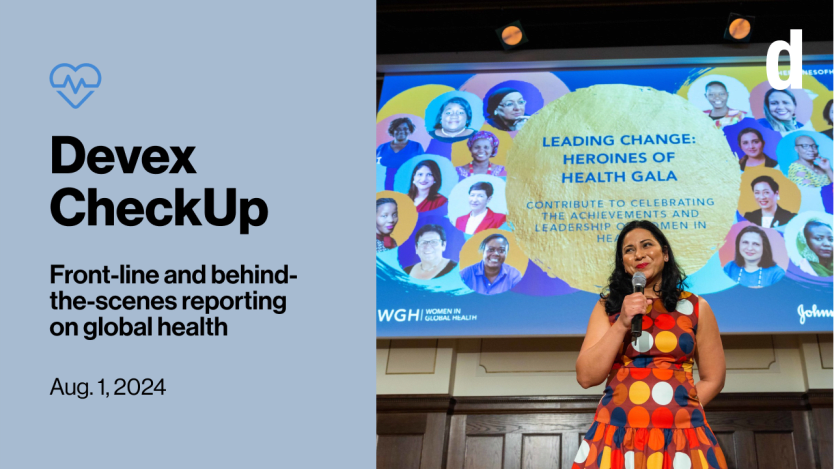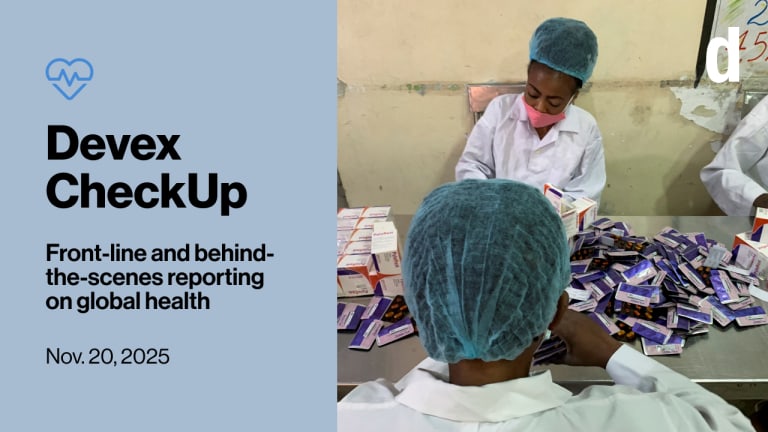
When Women in Global Health launched in Geneva in 2015, there were only about 25 people in attendance. But in less than a decade, the NGO grew rapidly. It now has 58 chapters globally, about 6,500 members, and an annual budget of $3.7 million, giving it the means to powerfully advocate for gender equality and women’s leadership, and challenge privilege often afforded to men in the sector.
But internally, not all was well.
Over the past few months, my colleagues Sara Jerving and Rumbi Chakamba uncovered accusations of racial discrimination and toxicity against the NGO’s senior leadership, which were followed by a series of resignations and terminations, including of its co-founder, Roopa Dhatt, dismissed by the board in May.
It began with a complaint in August 2023, when seven Black women who’d worked with the organization as contractors alleged “disempowering, humiliating and pernicious” behavior from senior leadership, and “an extremely high-pressure, demanding and relentless work culture.”
Mirna Martinez Santiago, the investigator hired by the board to examine the allegations, found that the organization had a “toxic” environment, which she defined as aggressive leadership, cliquish behavior, microaggressions, unrealistic workloads, low pay, and an atmosphere of fear. She also found evidence of a “white supremacy culture,” and an organization suffering from “Founder’s Syndrome.”
This is a preview of Devex CheckUp
Sign up to this weekly newsletter for exclusive global health news and insider insights in your inbox every Thursday.
The investigation did not find basis for other allegations, including bullying and harassment, but found Dhatt to be demanding and a micromanager and recommended improvements in governance.
But the complaints continued, eventually leading the board to terminate Dhatt’s contract. The NGO has since started to restructure. As a start, it will no longer be led by a single head, but by five people sharing leadership responsibilities, which includes a newly appointed coordinating director.
One former board member tells Sara that they hope the saga will serve as a valuable lesson for others to take governance and accountability seriously. But another says it’s important that Women in Global Health survives the scandal because other organizations haven’t stepped in to fill its shoes when it comes to combating gender inequality in the sector.
Exclusive: Probe finds Women in Global Health had ‘toxic’ environment
Speaking of women …
The four male candidates wishing to become the next WHO regional director for Africa outlined their priorities before the region’s health ministers during a candidates forum last week.
Sara says the candidates presented many similar priorities, including helping the continent adapt to the impact of climate change on health systems and preparing for health emergencies. They also worked to set themselves apart from each other.
But they seem to forget something equally important: Sexual and reproductive health and rights, which is facing a moment of global backlash including in many parts of Africa.
An oversight, or the result of having zero women in the line up? Tell us what you think at checkup@devex.com.
Read: Meet the candidates for WHO’s top job in Africa (Pro)
+ Not yet a Devex Pro member? Start your 15-day free trial today to access all our expert analyses, insider insights, career resources, exclusive events, and more. Plus, you’ll get a discount for October’s Devex World 2024, a special event to connect with leaders, including health luminaries, shaping the future of global development.
The last of Lassa?
Nearly 1 in 5 people in Nigeria who contract Lassa fever, an acute viral hemorrhagic disease with symptoms similar to Ebola, die from it. It’s endemic across several West African countries, and this year Nigeria recorded nearly a thousand confirmed cases and more than 7,000 suspected.
Public health officials have few tools to prevent the spread, beyond raising awareness and promoting good hygiene. But that might change in the future. Phase 2 clinical trials for a Lassa fever vaccine are currently underway in Nigeria and Liberia, using the same platform that Merck used for its single-dose Ebola vaccine.
In Nigeria, the trial was delayed by a lengthy approval process from the National Agency for Food and Drug Administration, one source tells Devex contributing reporter Paul Adepoju. But now the country is expected to finish its trial vaccination efforts by the spring of 2025. Success could allow the vaccine to move on to late-stage trials, and eventually become part of routine immunization.
Read: How a new vaccine candidate could outpace Lassa Fever’s deadly grip
Far from the finish line
The 100 Days Mission’s ambition is to develop safe and effective medical tools — such as vaccines, therapeutics, and diagnostics — within the first 100 days after a pandemic threat is identified. But it’s far from where it needs to be.
During a panel at the Global Pandemic Preparedness Summit in Brazil early this week, Dr. Ayoade Alakija, chair of global alliance for diagnostics FIND, said the world is not yet ready when it comes to developing such tests. And why? Because there’s no money.
“The vaccines are shiny and they’re fun and they can have big, nice conferences. Us poor kids in the corner also need some attention,” she said. “Show me the money, honey.”
As for vaccines, it depends on the virus. CEPI CEO Richard Hatchett said: “If a new coronavirus will emerge, I think we could deliver in 100 days.” However, if the new disease is caused by virus families behind diseases such as measles and mpox, “I’m concerned that we’re not there yet,” he said.
Your next job?
Director Partnerships, Resource Mobilization and Advocacy
Financing Alliance for Health
Worldwide
Developing medical products in record time isn’t the only challenge. Attention should also be given to how to ensure developed vaccines can be produced and accessed on a global scale, according to professor Mario Moreira, president of scientific institution Fiocruz in Brazil. Even after vaccines were developed against COVID-19, the world did not manage to produce enough of them in “meaningful time,” he said. Getting people to accept the vaccines is yet another challenge.
“One of the points that I’m worried about, and what we faced during COVID, was to convince a population that a vaccine that was developed in such a brief period of time was effective and safe,” he said.
What we’re reading
Gaza’s health ministry declares polio epidemic. [Al Jazeera]
North Korea receives more than 4 million vaccine doses, the first delivery of medical aid since the COVID-19 pandemic. [The Guardian]
Argentina-based Sinergium Biotech firm has agreed to share know-how in producing H5N1 vaccines with WHO co-hosted messenger RNA vaccine technology transfer hub. [Health Policy Watch]








